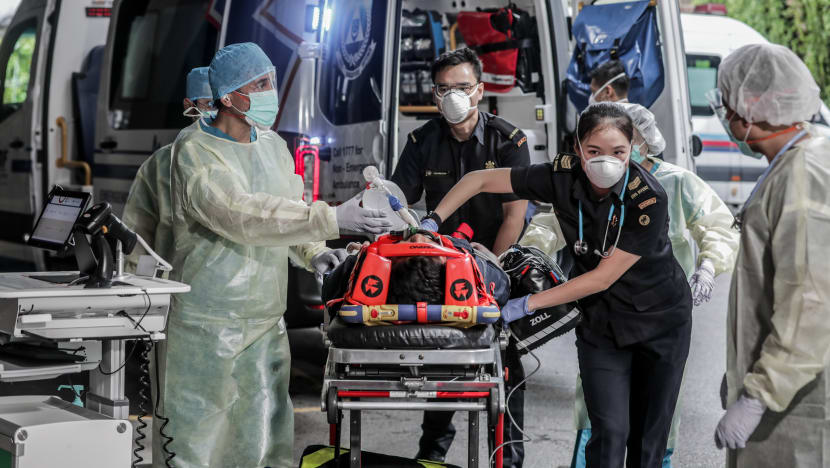SCDF has ‘implemented various measures’ following 35% spike in emergency medical service calls

SINGAPORE: The Singapore Civil Defence Force (SCDF) has seen a 35 per cent increase in the number of calls requiring emergency medical services in the past three weeks, it said on Friday.
This is an increase from an average of about 550 calls per day to about 750 calls per day.
Responding to CNA queries, an SCDF spokesperson said the COVID-19 situation had “put a tremendous strain” on the healthcare system, including the force’s emergency medical services.
“To ensure the safety of the patients we convey, we have introduced infection control measures for EMS (emergency medical services), including decontaminating our ambulances after conveying every COVID-19 patient.
“In addition, in the last three weeks, SCDF has seen about a 35 per cent increase in the number of calls requiring EMS, from an average of about 550 calls a day to about 750 calls a day.”
To address this, the SCDF has “implemented various measures” to ensure that it can continue to “respond swiftly” to life-threatening emergencies, said the spokesperson.
“SCDF would like to assure the public that we remain committed to attending to day-to-day medical emergencies, while helping the national effort to manage the COVID-19 situation,” the spokesperson said.
"30- TO 40-MINUTE WAIT"
This comes after a Straits Times reader said she was told she would have to wait 30 to 40 minutes for an ambulance after making an emergency call.
In a forum letter published on Oct 7, Ms Tan Kexin said, on Sep 29, she had called 995 after father collapsed in the toilet.
“I was shocked when the call operator told me that all ambulances had been deployed because of COVID-19 cases and there would be a 30- to 40-minute wait for an ambulance to reach us,” Ms Tan wrote.
“The ambulance eventually took 30 minutes to arrive, even though it was a weekday afternoon with little traffic and my home is a five-minute drive to the nearest restructured hospital, which the ambulance took him to.
“I understand that we are in the middle of a pandemic, but I find it strange to be told at the time I called that all ambulances had been deployed and capacity was strained because of COVID-19.”
Ms Tan wrote: “Every second counts for patients who have suffered an emergency condition like cardiac arrest, stroke or a traffic accident, while the outcome is unlikely to be much different for a suspected COVID-19 case if he is taken to the hospital an hour later.
“Is this the most effective way to triage? Are we inadvertently prioritising some lives over others in how we are handling this pandemic?”
SCDF RESPONDS
In its response, the SCDF thanked Ms Tan for her “feedback” and added that the team had since spoken to her about her concerns.
“We understand the anxiety of Ms Tan and her family, and agree that every second counts during critical medical emergencies such as cardiac arrest, stroke and trauma,” said the spokesperson.
The SCDF’s emergency medical service prioritises life-threatening emergencies, the spokesperson stressed.
“Since 2017, SCDF has put in place the 995 call triaging system to assess and differentiate medical cases based on their severity. The system helps us better manage our resources by dispatching the most appropriate resources for each case.”
Speaking in Parliament earlier in October, Senior Minister of State for Health Dr Janil Puthucheary said that the Health Ministry had set up a dedicated fleet of 95 additional ambulances to send COVID-19 patients to different healthcare facilities.
Before mid-September, it took 12 hours to send patients above 70 who test positive for COVID-19 in a polymerase chain reaction test to the hospital, said Dr Puthucheary.
That figure had since risen to between 48 hours and 72 hours from the time such patients get their results, he added, citing this as an example of how the recent spike in COVID-19 cases had impacted Singapore’s healthcare capacity.














